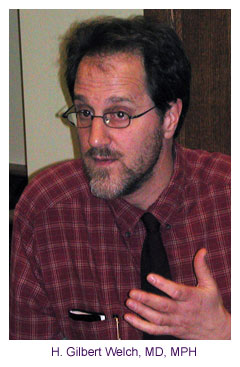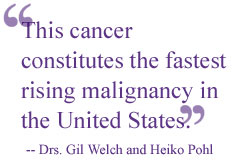|
|
For Release: January 18, 2005
Contact: DMS Communications (603) 650-1492
Print Version
Increase in Esophageal Cancer is Real,
Dartmouth/VA Researchers Say
Hanover, NH/White River Junction, VT - The marked increase in cancer of the esophagus over the last 25 years represents a real disease burden in the U.S. that is as yet unexplained, according to researchers from Dartmouth Medical School and the VA Outcomes Group.

Writing in the January 19 issue of the Journal of the National Cancer Institute, DMS and White River Junction, Vermont VA physicians Heiko Pohl and H. Gilbert Welch report that two potential causes of apparent increase in disease incidence - overdiagnosis and reclassification - do not account for the rise in the number of cases of one type of esophageal cancer.
"Our results strongly indicate that the increase... represents a true increase in disease burden," the authors write. "In fact, this cancer constitutes the fastest rising malignancy in the United States." They also emphasize, however, that esophageal cancer is still relatively rare and much less common than cancers of the lung, colon and breast.
The authors note that approximately 14,000 Americans were diagnosed with esophageal cancer in 2004. Of these, more than half had esophageal adenocarcinoma, a cancer affecting the glands in the lower third of the esophagus. While rates of other types of esophageal cancer have actually fallen during the time period of the study, Pohl and Welch report that deaths from this type have risen from 2.5 to 20 deaths per million since 1975.
The study, based on data from the Surveillance, Epidemiology, and End Results (SEER) database, was designed to determine if the dramatic rise in adenocarcinoma esophageal cancer could be attributed to increased screening - from procedures such as diagnostic endoscopy - and resultant overdiagnosis of conditions that would not otherwise have produced signs or symptoms before death, or because of reclassification - a change in how diagnostic terminology is applied.

Using data from 1975-2001 the researchers, found however, that despite increased diagnostic intensity, there was only a small increase in the proportion of early cancers at diagnosis during that period. Logical reclassifications were also ruled out as an explanation based on their analysis.
"The rate of increase in esophageal adenocarcinoma is greater than that of any other major malignancy in the United States," write Pohl and Welch. "Dramatic increases in disease incidence need to be explained. Pohl and Welch conclude that identifying the risk factor responsible for the increase must be a priority.
H. Gilbert Welch, MD, MPH is a professor in medicine, and community and family medicine at Dartmouth Medical School (DMS), a member of the Center for the Evaluative Clinical Sciences at DMS, and co-director of the VA Outcomes Group, based at the Veterans Affairs Medical Center in White River Junction, VT. Heiko Pohl, MD is a member of the VA Outcomes Group and was supported in this research by a Veterans Affairs Special Fellowship in Outcomes Research.
-DMS-